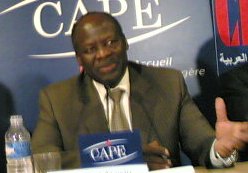Sudan open to thousands more AU Darfur troops – FM
April 15, 2007 (KHARTOUM) — Sudan will take as many more African Union (AU) troops as needed to stabilise Darfur but will not bow to international pressure to accept a U.N. force in the troubled region, its foreign minister said on Sunday.
 Lam Akol reiterated Khartoum’s firm rejection of international troops in Darfur as visiting U.S. Deputy Secretary of State John Negroponte pressed Sudanese officials to accept thousands of U.N. peacekeepers to support the world’s biggest humanitarian effort there.
Lam Akol reiterated Khartoum’s firm rejection of international troops in Darfur as visiting U.S. Deputy Secretary of State John Negroponte pressed Sudanese officials to accept thousands of U.N. peacekeepers to support the world’s biggest humanitarian effort there.
Khartoum had agreed on a plan to deploy two more battalions — which usually number between 500 and 1,000 troops — of African forces but was now open to a much larger number to support 7,000 AU troops in Darfur, Akol said.
“Of course some members of the U.N. Security Council wanted a bigger number,” he told Reuters in an interview.
“This is why we agreed to a technical group to go on the ground and be assisted by the Sudanese government to arrive at the figure they want. And that figure we will respect.”
Asked if Sudan would accept up to 10,000 more troops, for instance, Akol said: “We don’t have any problem if it is determined on a professional basis.”
In the latest sign African soldiers are struggling in Darfur, gunmen killed a major serving in the force, an AU spokesman said on Sunday, making April the deadliest month so far for the African troops.
The United Nations is nearing a deal with Khartoum to add 3,000 U.N. military personnel and equipment to the AU force under a so-called heavy support package but Sudan has so far objected to the U.N. fielding six attack helicopters.
Khartoum is likely to accept aircraft, said Akol, adding, “we are looking at it favourably.”
US SANCTIONS?
At the heart of the debate is the outcome of a November meeting in Addis Ababa. The U.N. says Khartoum agreed then to a three-phase plan that would end with a hybrid AU-U.N. operation in Darfur. Sudan said it only agreed to the first two phases.
Akol said Sudanese officials told Negroponte pressure over a U.N. force would only exacerbate Darfur’s humanitarian crisis and he brushed aside U.S. threats of possible sanctions.
“They are free to impose whatever sanctions they want. Actually at the moment there are U.S. sanctions on Sudan. If they want to impose them, that is there business. But this has nothing to do with the operation that has been agreed upon.”
Negroponte later held talks with Sudanese President Omar Hassan al-Bashir, saying they discussed their respective views of the humanitarian, security and political situations in Darfur. He did not elaborate.
Experts estimate about 200,000 people have been killed and 2.5 million have fled their homes since the Darfur conflict flared in 2003 when rebels took up arms against government forces, saying Khartoum had neglected the area.
Sudan signed a peace agreement with only one Darfur rebel faction last year but since then other groups have splintered, contributing to instability fuelled by feuding tribes, bandits and the so-called Janjaweed militias.
Darfuris say the Janjaweed are backed by the government in their campaign of killing, raping and pillaging villages. Khartoum calls them outlaws and denies any links to them.
The Darfur peace agreement calls on the Janjaweed to be disarmed but Akol said only a comprehensive peace deal would convince fighters thriving on chaos that has driven away aid groups to put down their weapons.
“If the war is still going on how would you take away somebody’s gun? He will not feel secure,” he said.
Asked how long Darfur’s suffering will last without a peace agreement, Akol said it was up to the rebels. But he stressed they were unlikely to make concessions to a Sudanese government that is constantly under outside pressure.
“If they see that the pressure is only on Sudan. It is always Sudan being condemned. … It is Sudan being threatened with sanctions. They will not be in a hurry to look for a peaceful resolution because they will always think that the knot is being tightened,” said Akol.
“As I told you it takes two to tango.”
(Reuters)
